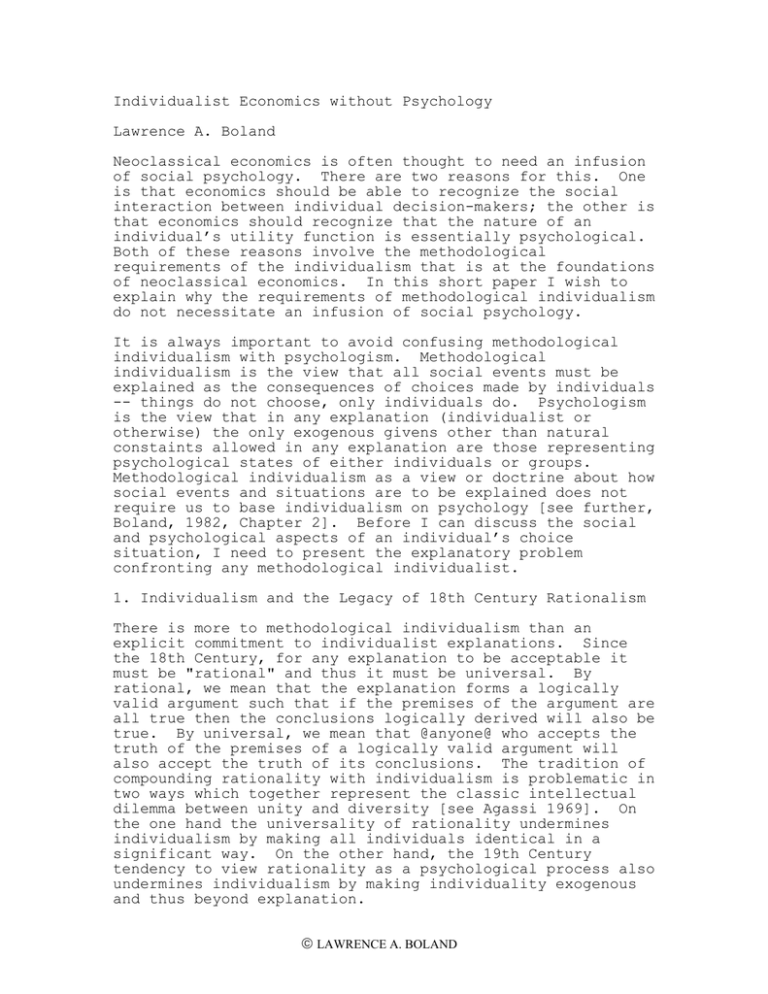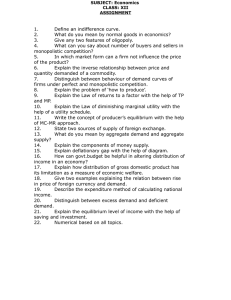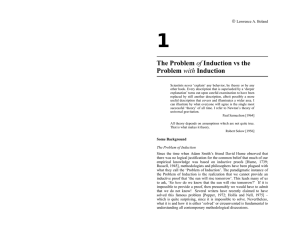Individualist Economics without Psychology Lawrence A. Boland
advertisement

Individualist Economics without Psychology Lawrence A. Boland Neoclassical economics is often thought to need an infusion of social psychology. There are two reasons for this. One is that economics should be able to recognize the social interaction between individual decision-makers; the other is that economics should recognize that the nature of an individual’s utility function is essentially psychological. Both of these reasons involve the methodological requirements of the individualism that is at the foundations of neoclassical economics. In this short paper I wish to explain why the requirements of methodological individualism do not necessitate an infusion of social psychology. It is always important to avoid confusing methodological individualism with psychologism. Methodological individualism is the view that all social events must be explained as the consequences of choices made by individuals -- things do not choose, only individuals do. Psychologism is the view that in any explanation (individualist or otherwise) the only exogenous givens other than natural constaints allowed in any explanation are those representing psychological states of either individuals or groups. Methodological individualism as a view or doctrine about how social events and situations are to be explained does not require us to base individualism on psychology [see further, Boland, 1982, Chapter 2]. Before I can discuss the social and psychological aspects of an individual’s choice situation, I need to present the explanatory problem confronting any methodological individualist. 1. Individualism and the Legacy of 18th Century Rationalism There is more to methodological individualism than an explicit commitment to individualist explanations. Since the 18th Century, for any explanation to be acceptable it must be "rational" and thus it must be universal. By rational, we mean that the explanation forms a logically valid argument such that if the premises of the argument are all true then the conclusions logically derived will also be true. By universal, we mean that @anyone@ who accepts the truth of the premises of a logically valid argument will also accept the truth of its conclusions. The tradition of compounding rationality with individualism is problematic in two ways which together represent the classic intellectual dilemma between unity and diversity [see Agassi 1969]. On the one hand the universality of rationality undermines individualism by making all individuals identical in a significant way. On the other hand, the 19th Century tendency to view rationality as a psychological process also undermines individualism by making individuality exogenous and thus beyond explanation. LAWRENCE A. BOLAND To illustrate these methodological problems, consider the following hypothetical situation. Our closest friend has been caught robbing a bank. Demanding an explanation, we ask, "why did you rob the bank?". Before we allow our friend to answer, we must recall that to be an acceptable explanation the explanation given either by us or by our friend must be rational and methodological individualist. Individualism only precludes choices being made by things. Rationality is established by examining the logic of the situation facing our friend, the bank robber. By asking our friend for an explanation we are asking him to give a description of the logic of his situation. Specifically, we ask him to give reasons which represent (1) his aims and (2) the constraints that restrict the achievement of his aims. If he can describe the logic of his situation such that we would agree that anyone who faced that exact situation (aims and constraints) would also rob the bank, then we would say that we understand why he robbed the bank. For example, he may tell us that his child needs a very expensive operation and he wants his child to have that operation but there is no legal way he could afford it before it would be too late. Robbing the bank was the only way to achieve his aim. If his description of the situation is true (i.e., there really is no other way possible), then given his aim (save his child) it would be rational for him to rob the bank -- in fact, it might be considered rational for anyone with that aim and those constraints. The logical requirements of an explanation of individual behaviour are the same whether we are discussing our friend the bank robber or the individual consumer choosing to spend his or her money on tomatoes and cucumbers. In the case of the individual consumer, the aim is supposedly the maximization of utility obtained from consuming what one has purchased while facing the constraints of given prices, given purchasing power (one’s budget or income) and a given utility function. Such utility maximizing behaviour is rational in the sense that any two individuals with the same utility function and same income facing the same prices will choose to consume the same quantites of goods so long as each individual aims to maximize his or her utility. Rationality assures such universality and uniqueness of choice. The idea that rationality assures universality is characteristic of 18th Century "Rationalism" and thus is fundamental to the origins of ordinary economics. The identification of rationality with utility maximization is a late 19th Century perspective and the foundation of neoclassical economics. In terms of modern economics, the quantities of goods the individual consumes are considered endogenous variables. Only the utility function is unambiguously exogenous. Income and prices are treated as constraints to the individual but not to the economy as a LAWRENCE A. BOLAND whole so whether they are endogenous or exogenous depends on the situation we choose to model. In neoclassical economics our task is to explain individual choices in order to explain how prices affect demand so that we can explain how demand influences prices in the market; in other words, prices and incomes (which depend on factor prices) are endogenous. From a logical point of view (and contrary to what some people think [e.g., Mason 1987]), a single individual’s choice is easier to explain than a market demand curve. This is because in consumer theory we can treat the prices and income facing the individual as exogenous variables leaving only the consumer’s choice as the endogenous variable to explain. Any explanation of a market’s demand curve requires us to explain all consumers’ choices as well as all the other market prices that these consumers face. Of course, we would also have to explain the supply curve in every market in question. 2. Unity vs. Diversity in Methodological Individualism Neoclassical economics, nevertheless, claims to explain all prices and the allocation of all fixed resources. How is it possible for one theory to explain so much? The particular value of prices (or state of resource allocation) depends, of course, on the nature of each individual’s utility function. In this context methodological individualism allows both diversity and unity. Diversity is promoted by recognizing that some people will spend more of their income on tomatoes than other people do. Unity is promoted by the claim that all individuals are maximizers. This means that all people face falling marginal utility curves (a necessary calculus condition for maximization). Does this mean all people are identical and thus deny individuality? No, so long as everyone faces downward sloping marginal utility curves, the absolute position of that curve (relative to other goods) need not be the same for all individuals. For the same amounts of tomatoes and cucumbers, some may get more satisfaction from tomatoes, others get more from cucumbers. Also, some people may have steeper marginal utility curves than other people do. We see that on the one hand individuality is preserved since even facing the same prices and incomes, two maximizing individuals may choose different quantities if their exogenously given utility functions are different. On the other hand, universality is provided by the common nature of utility functions if it can be shown that as a matter of human nature all utility functions exhibit diminishing marginal utility. This is the methodological dilemma of individualist-cumrationalist economics. If the (equilibrium) values of prices depend only on the different utility functions which are exogenously given, then prices are actually determined LAWRENCE A. BOLAND outside of economics. Whatever determines the nature of the given utility functions ultimately determines prices. Does this mean that economics must surrender to psychology as it has often been suggested [see Scitovsky 1976]? Identifying the individual with his or her psychologically given utility function is a rather sophisticated and subtle type of psychologism. A more blunt and obvious use of psychology would be for us (or our friend the robber) to explain the event by claiming that our friend has a ’criminal mentality’. But such a crude psychologism would seem to be our only recourse if we are to avoid the moral dilemmas involved in the explanation based on the logic of the situation. If the robber’s choice to rob the bank was a rational one, how can we object? Crude psychologism also avoids an intellectual dilemma. When our friend (as a bank robber or a consumer) provides an "acceptable" explanation, one which says that anyone facing that position would choose to do the same thing, the individuality of the situation is revealed to be empty. If any individual would do the same, then there is nothing individualistic about the choice made. Crude psychologism (i.e., the view that behaviour is predetermined by given mentalities) as an explanation of individual choices may seem to be a way to promote psychology. It is not; it only begs more questions. What determines who gets which mentality? How many different mentalities are there? In the extreme, crude psychologism may even lead us to discard psychology in favour of socio-biology. If we thus reject crude psychologism, we are then left with our two dilemmas. The moral dilemma (the rationality of one’s choice to commit a crime) is not easy to overcome and in the end is more a question of philosophy than of psychology. The intellectual dilemma is the foundation of attempts to promote psychology in the development of economic explanations of individual behaviour. If we allow ourselves to assume that psychologically all individuals are given different exogenous utility functions, then individuality will seem to be preserved in our explanations of rational choice. However, whenever psychologism is adopted as a means of promoting individualism, it is a defeatist methodological stance. Individualism is in trouble here only because neoclassical economics misleadingly identifies the individual’s aims with the individual’s psychologically given utility function. Two individuals facing the same prices and with the same income will usually choose different consumption bundles if they have different utility functions. If our problem as economists is to explain a wide diversity of choices made by people in the same income class, then the psychological reasons for why people have different given utility LAWRENCE A. BOLAND functions would certainly seem to be a promising line of enquiry. But, it is not a necessary line of enquiry since one may just as easily presume that the individual’s utility function is socially determined. The traditional emphasis on individualism seems to force an excessive concern for diversity to the point that economists (as opposed to sociologists) tend to overlook obvious social circumstances where diversity is more conspicuous by its absence. Specifically, the problem that should be of concern to individualist economists is to explain widespread conformity whenever considering consumption patterns. In most cultures, each social role is closely associated with a specific consumption pattern. Accountants or lawyers in similar income brackets will usually have consumption patterns much like their colleagues. Non-conforming individualism is more the exception than the rule in organized society. For example, corporate lawyers tend to dress alike, belong to the same social clubs, acquire the same ostentatious goods such as expensive automobiles, houses, etc. Moreover, their conspicuous consumption is not a psychological phenomenon [cf., Baxter 1987] but rather it shows how profoundly one’s preference ordering is dependent on social structure. In short, one’s consumption choices may be determined more by one’s social position than one’s personal tastes [see Newman 1972, Hayakawa and Venieris 1977]. 3. Unnecessary Psychologism I do not wish anyone to think that by my recognizing that utility functions (or more generally, personal aims) are matters of sociological enquiry that I am thereby rejecting individualism. Such is not the case. Social situations and institutions are the consequences of individual choices [see also Boland 1979]. All that I am arguing here is that there is no necessity to see deviations from narrow-minded neoclassical economics as expressions of irrationality and hence a demonstration of a need to study the psychology of the individual. Irrationality is easily interpreted as merely an expression of the incompleteness of the description of the logic of the situation facing the individual [Becker and Stigler 1977]. Perhaps a more complete description might involve psychology but psychology is not a necessity here. An individual whose utility function is completely determined by social conventions is no less capable of making a rational decision than the individual whose utility function is psychologically given. In summary, a successful methodological-individualist explanation of the behaviour of a rational decision-maker is a matter of establishing the logical completeness of the decision-maker’s objective situation. It is not necessarily a matter requiring the recognition of a possible role for the decision-maker’s psychological predispostion. LAWRENCE A. BOLAND References Agassi, Joseph, 1969, "Unity and diversity in science", in Cohen, Robert and Wartofsky, Mark (eds.), Boston Studies in the Philosophy of Science,4 (New York: Humanities Press), 463-522. Baxter, John, 1987, "Intervening variables in economics: an explanation of wage behavior" (Chapter 8, above). Boland, Lawrence, 1979, "Knowledge and the role of institutions in economic theory", Journal of Economic Issues, 8, 957-72. Boland, Lawrence, 1982, Foundations of of Economic Method (London: George Allen & Unwin). Hayakawa, H and Venieris, Y, 1977, "Consumer interdepence via reference groups", Journal of Political Economy, 83, 599-615. Mason, Roger, 1987, "The psychological economics of conspicuous consumption", (Chapter 9, above). Newman, Geoffrey, 1972, "Institutional choices and the theory of consumer behavior", unpublished MA thesis, Simon Fraser University. Scitovsky, Tibor, 1976, Joyless Economy (Oxford: Oxford University Press). Stigler, George and Gary Becker, 1977, "De gustibus non est disputandum", American Economic Review, 67, 76-90. LAWRENCE A. BOLAND




